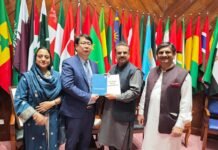Melbourne, 5 July 2022 (TDI): Oxfam Australia acknowledged their First Peoples’ Program strategic lead, Ngarra Murray for being included on the Women’s Agenda list of First Nations changemakers as they celebrate NAIDOC week.
As we celebrate #NAIDOCWeek2022 , we are so proud to see our First Peoples’ Program strategic lead @ngarra_murray included on a @WomensAgenda list of First Nations changemakers. What an inspiring group of people! https://t.co/cnXkufpefA
— Oxfam Australia (@OxfamAustralia) July 5, 2022
NAIDOC week continues up to 10 July 2022 with the purpose of honoring the history, successes, and culture of Aboriginal and Torres Strait Islander peoples.
Therefore, the NAIDOC theme of the year 2022 is “Get Up! Stand Up! Show Up!”. The focus of the theme is to increase the visibility of First Nations people. Together with closing the gap between “aspiration and reality, good intent and outcome.”
10 First Nations changemakers
The 10 First Nations changemakers have stood up to “create change, improve outcomes, and champion the voices and stories” of other Aboriginal and Torres Strait Islander people.
Oxfam Australia’s First Peoples’ Program strategic lead, Ngarra Murray is a Wamba Wamba (Gourmjanyuk) Yorta Yorta (Wallithica) woman.
In September 2017, Murray joined the National NAIDOC Committee. Moreover, she has worked in the Melbourne Aboriginal community for the past two decades. Specifically, holding positions in the government as well as community sectors.
As the National Manager at Oxfam Australia’s Aboriginal and Torres Strait Islander Peoples’ Program, Murray works in supporting First Nations people in strengthening their voice and achieving self-determination and eliminating injustice.
Alongside increasing governments’ participation in political and other decision-making processes, building public support to close the gap, and achieving Indigenous equality.
Furthermore, among the 10 First Nations changemakers are Mykaela Saunders Koori, Claire G. Coleman, Amy Thunig, Allira Potter, Megan Davis, Merrissa Nona, Murrawah Johnson, Nayuka Gorrie, and Vanessa Turnbull-Roberts.
Mykaela Saunders Koori is a Lebanese queer writer. Also, she has worked in Aboriginal education in many capacities for almost two decades.
Claire G. Coleman’s works offer a critical remark on Aboriginal and Torres Strait Islander people and how colonial brutality has impacted the lives of the people.
Amy Thunig researches the intersection of Indigenous knowledge, sovereignty, and formal education systems.
Her thesis ‘Sovereign women: why academia?’ utilizes Indigenous research methodologies. Thus, in recording and analyzing the choices, motivations, and experiences of First Nations women academics.
Allira Potter aims to debunk the wellness narrative so as to make sure that there is diverse representation in society.
Also, Megan Davis is the Cobble Cobble Indigenous rights expert. Davis also became the first Indigenous person from Australia elected to the UN Permanent Forum on Indigenous Issues.
In addition, Merrissa Nona is the Cairns-based CEO of Deadly Inspiring Youth Doing Good (DIYDG), a youth-led non-profit Aboriginal & Torres Strait Islander Corporation.
It is a youth-led non-profit corporation that provides a platform for the people to lead their communities. Most importantly, Nona has spent several years as a passionate community leader.
Murrawah Johnson serves as a spokesperson, community organizer, and campaigner for the Wangan & Jagalingou Traditional Owners Family Council campaign. Murrawah is the South East Queensland Coordinator for Seed, Australia’s first Indigenous youth climate network as well.
Nayuka Gorrie has long been actively defending the rights of Indigenous peoples and radical feminism.
Lastly, Vanessa Turnbull-Roberts has devoted years to raising awareness regarding the importance of abolishing child protection in the lives of First Nations communities. As well as juvenile detention centres.
Student of BS International Relations in Kinnaird College for Women. Currently, working in 'TDI' as a contributor.








